State of It: Labour Jitters n Poster-Boy Politics
State of It: Labour Jitters and Poster-Boy Politics
By Selwyn Manning – Scoop Media co-editor
State of It: The latest in a series of polls has shown a trend where Labour is in serious trouble. Can Helen Clark beat off National leader John Key in what is shaping up as a land-slide loss for Labour? And what of leadership coups?
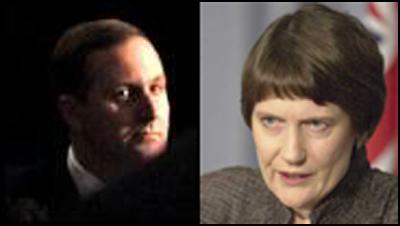
The latest in a series of polls has shown a trend where Labour is in serious trouble with a significant proportion of those canvassed expressing a preference for the National Party and most significantly for its leader John Key. Are we witnessing the beginning of the end of Labour leader Helen Clark's reign as prime minister? And what can Labour do to arrest the rise and rise of National's John Key.
This past weekend's Fairfax Media-Nielsen poll recorded National to have raced ahead to 55 per cent support with Labour trailing well behind at 32 percent support from those polled. Based on that poll, National had advanced a 23-point lead over Labour.
What's more, in the preferred prime minister ranking, John Key was enjoying 44 per cent support from those polled compared to 29 per cent for Helen Clark.
Perhaps the most important evaluative poll is the Molesworth & Featherston rolling poll.
 Even
prior to this past weekend's Fairfax Media-Nielsen poll,(see
Dominion Post's article:
Labour Poll Axed ) M&F's calculations had displayed
a trend that showed Labour wading in cement when compared to
a seemingly nimble-footed National Party. That trend,
arguably, questioned Labour's strategy to roll out in depth
solution-based policy as a means of displaying National's
vulnerabilities on policy detail.
Even
prior to this past weekend's Fairfax Media-Nielsen poll,(see
Dominion Post's article:
Labour Poll Axed ) M&F's calculations had displayed
a trend that showed Labour wading in cement when compared to
a seemingly nimble-footed National Party. That trend,
arguably, questioned Labour's strategy to roll out in depth
solution-based policy as a means of displaying National's
vulnerabilities on policy detail.
The tactic may have won favour with those who follow politics closely, but clearly it has not found an accord with the public.
On February 21, M&F reported:
"This week’s One News-Colmar Brunton survey will have been a blow to the Government’s hopes after a series of polls where the gap had narrowed to less than ten percentage points. All eyes will be on polls over the coming week to see if the 53 per cent for National in the One News poll was an outrigger or the sign that Labour’s modest New Year revival is over already. Heads were certainly down in the Beehive this week after the Owen Glenn non-scandal wiped away memories of a much better week for Labour…"
M&F summarised: that its rolling poll of polls placed National with 49.28 per cent party vote support. This equated to 62 seats in a 122 member Parliament with Labour trailing on 34.84 per cent or 44 members in The House:
"It’s a 122 seat Parliament with - as usual - the Maori Party and Jim Anderton providing over hang seats. National can govern Alone," M&F reported.
This weekend's Fairfax Media-Nielsen poll result will further stretch National's lead in the M&F rolling poll of polls.
Can Labour continue to campaign solely on policy and experience? Yes it can but that strategy is tarnished with flaws. As the Dominion Post's Tracey Watkins pointed out this year's policy roll out had "no impact on voters". The policy referred to is expressly Labour's housing affordability plan and its band-aid 'solution' to address serious youth offending - ie; keeping young people in school or education until they turn 18.
The fact that these two key policies have had no positive effect on Labour's popularity-slide would suggest a lack of public confidence in Labour's ability to provide real solutions to real problems.
The two policies are poles apart in their purpose and makeup. The housing policy, it appears, failed to garner mass-enthusiasm even from centre-voters who were specifically targeted as beneficiaries of this policy announcement. Affordable homes were only really affordable to those whose family income was over $70,000 per annum. And it would appear that Labour failed to connect the concept of equity funding to those who would fail the 70k test, and thus a solution to the unaffordable tier of 'affordable homes'. Thus, those on the low-side of the socio-economic axis were perceived to be excluded from benefiting from Affordable Homes.
Labour's inability to draw confidence from voters who transcend the economic spectrum on solution-based policies (as in the case of youth offending) is also in evidence.
In a most recent case Labour was forced by Manukau local government politicians close to itself, to front-up and provide solutions to spike in youth murders and drive-by shootings in south Auckland. The result was a visit by Police Minister Annette King to Otara's Clover Park suburb for a media opportunity alongside the city's new mayor, Len Brown. The problem with this photo-opportunity was it offered anyone, who wished to notice, an appearance of: too little too late (at best), and (at worst) lip-service to a most serious and complex social disorder situation.
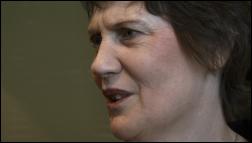 The Prime Minister was left to wade in where her political
instincts would have suggested she resist – but for a
political void opening up where the National Party could
easily occupy and build solid policy.
The Prime Minister was left to wade in where her political
instincts would have suggested she resist – but for a
political void opening up where the National Party could
easily occupy and build solid policy.
The crime-wave has been rising in our urban expanses for years. The severity-factor is not lost on the public even where official statistics fail to display this urban reality.
The reasons for this trend lie squarely outside the reactionary aspects of crime, policing, and justice policy, but rather test the effectiveness that the proactive aspects of these policies have and pay challenge to the inadequacies of core social and prosperity-generating policies that mark the tenure of Labour's 1999-2008 term of government.
Labour must address this fact with pragmatic policies that work, and, as it is an election year, sprinkled with a touch of mass appeal - despite the understandable cringe.
The severity of youth crime has been intensifying in the public consciousness year on year - perhaps marked with the pack-killing of Pizza delivery man Michael Choy in Papakura-east in 2001. The killing of course occurred when a premeditated plan was kicked into action by a disengaged horde of school children. That culture has continued to take shape to a degree where sinister youth crime elements now invade beyond the fringe and affect New Zealanders' lives with a frequency that is simply chilling.
Labour now owns every problem the country faces and cannot dodge blame by pointing to the policies of the National Party. Pointing the finger at National for the neglect it was responsible for throughout the 1990s is now ineffective strategy. There may be sound reasons to do so, but the public clearly is intolerant.
So, does Helen Clark need to reinvent herself? Is it simply that people are tired of the same old same old Labour Party and its leader? There are parallels here to the 2007 Australia Federal Election (albeit that was a much more complex affair) and what could be termed the John-Howard-Factor ie; the over-familiar-factor based on the old adage 'familiarity breeds contempt'.
Will Labour continue to lose favour? Can its more centrist-faction leader Phil Goff rebuild the party? Probably, once the 2008 General Election is over.
As other commentators have said, in this election year the sharp drop in Helen Clark's popularity is Labour's biggest worry. Obviously, there remains hope inside Labour, that her strength as a technocrat, her solid grasp on real policy, will out-perform National leader John Key in the election campaign.
In simple language: don't write Helen Clark off, especially once campaign proper begins and she takes her bear-pit style of politics out of the debating chamber and into the public's arena.
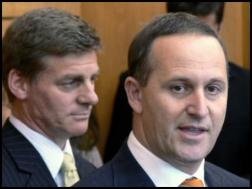 If a presidential-style campaign is in order
John Key is clearly a winner with the public. He is able to
inject general humour into his delivery, unlike Clark who
tends to target her humour at the expense of her opposition.
Key also presents a common-roll-your-sleeves-up style that
is significantly different to his predecessor, Don
Brash.
If a presidential-style campaign is in order
John Key is clearly a winner with the public. He is able to
inject general humour into his delivery, unlike Clark who
tends to target her humour at the expense of her opposition.
Key also presents a common-roll-your-sleeves-up style that
is significantly different to his predecessor, Don
Brash.
In public Key is acutely aware, even if members of the public are not aware of whom he is… yet. John Key is quick to notice recognition from a stranger with a flashy, personable smile. He has been out shaking hands with New Zealanders disengaged from the 'mainstream' while gathering in the support of stereotypical conservatives and Tory punters.
In this regard, it appears the key to Key's plan is to ensure Maoridom sees him as approachable – therefore National's traditional constituencies tolerate him – even when he embraces Maori Party voters, even in the form of Tame Iti.
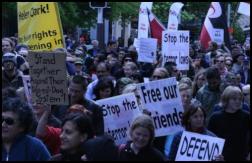 They know, as Maori do, that there's purpose to Key's
actions here, Maori may not agree with his policies, but
Maori can see they can connect with him where Helen Clark
remains aloof. And after all, the decentralised bent of
National Party governance is closer to the aspirations of Tino Rangatiratanga than the centralised
governance and policy development model Labour subscribes
to.
They know, as Maori do, that there's purpose to Key's
actions here, Maori may not agree with his policies, but
Maori can see they can connect with him where Helen Clark
remains aloof. And after all, the decentralised bent of
National Party governance is closer to the aspirations of Tino Rangatiratanga than the centralised
governance and policy development model Labour subscribes
to.
Key is getting better at connecting policy to pragmatism – and that is a sure winner with the Auckland voter. And one expects that as National roles out policy (perhaps this time accompanied by detail) of which Key owns rather than inherited – then his performance on delivery and implementation of policy will be sharper. From here, should things continue to go well for Key, we will see the emergence of a Leader-in-waiting… even though with National we are unlikely to see the roll-out of a Cabinet-in-waiting styled campaign. That would expose weaknesses it would prefer were kept hidden.
For those who subscribe to centre-left/centrist policies, a sound bet will be to exploit MMP to its extreme – to advance the notion of a NZ-First-Labour-Green-Progressive block that could gain support from the Maori Party. The bluff is to parade toward Polling Day gambling on a punt, that once the campaign-proper begins, that support for smaller parties will rise. But the public will need to embrace the subtleties of Mixed Member Proportional representation [MMP] and consider blocks of parties matter more that the single party with the largest proportion, percentage, of votes.
 But, I remember a political prophesy that former prime
minister David Lange suggested to me in 1996, that in the
future, the New Zealand voter would return to its
traditional support for two main parties - despite the
cluster effect and opportunity MMP presents. If Mr
Honourable was correct, the Kiwi-psyche will not accept the
voting block gamble.
But, I remember a political prophesy that former prime
minister David Lange suggested to me in 1996, that in the
future, the New Zealand voter would return to its
traditional support for two main parties - despite the
cluster effect and opportunity MMP presents. If Mr
Honourable was correct, the Kiwi-psyche will not accept the
voting block gamble.
So is Labour done like a dinner? Maybe. Is a Labour leadership coup likely? No. That's not likely prior to this year's election – not unless its MPs completely lose their wit in favour of the hare-brained.
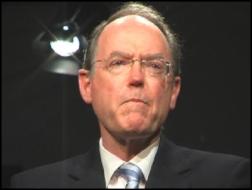 Those inside Labour, and a few outside too, suggest
it would be folly to under-rate Helen Clark. Her shrewd
political instincts saved the party from near defeat in
2005. But back then, National's leader Don Brash arguably
lost that election through the slow unraveling of a hidden
agenda and half-truths particularly in the final weeks of
the 2005 campaign.
Those inside Labour, and a few outside too, suggest
it would be folly to under-rate Helen Clark. Her shrewd
political instincts saved the party from near defeat in
2005. But back then, National's leader Don Brash arguably
lost that election through the slow unraveling of a hidden
agenda and half-truths particularly in the final weeks of
the 2005 campaign.
John Key is no Don Brash. Where Brash was the liberal-right's last-white-hope, John Key is quick-footed enough to abandon the ideology stodge, to traverse the right-centre-left divide to adopt policy that has mass-appeal. He is possibly more pragmatic than is credited to him, and it can be asserted that his thinking is solution based, if not opportunistic… at this juncture.
Key's strategy has left Labour reeling on many occasions. Labour is on the ropes not so much in Parliament's debating chamber, but rather out in the provinces and now, it seems certain, in the centrist-voting-constituencies of our large cities. And that prospect is a formidable landslide in the making should Key be able to attract provincial party list votes by the same proportion as Don Brash did in 2005.
As this election year loomed, it became increasingly obvious that Labour needed to match National's leader with the same attributes that John Key had used to draw favour from the public. The trouble is, for Labour, its leader did not and does not possess the ability to present such a perception.
Helen Clark is who she is. Simple as that. There's strength in her leadership, and it is founded on control – personal and of her colleagues. There's honesty in her like-it-or-lump-it style. But, this is not likely to win back the thousands of New Zealanders that are sensing a new way… a looming prime ministership in whom the public can connect irrespective of frailties. It isn't so much support for the National Party so many would care to forget, but rather for change. The new way prospect is a face that is neither aloof nor intimidating.
 If
Labour is to counter that, Phil Goff is Labour's man.
If
Labour is to counter that, Phil Goff is Labour's man.
Phil Goff is engaging, he's able to draw the best from a team, he's witty, and is the safest pair of political hands that Labour has in Cabinet. He can foot it on the world stage, and even on a mediocre day Phil Goff can match the best John Key can throw at him in the debating chamber - and given the opportunity to display leadership, his charisma, a factor that is often kept hidden from the public, will shine. These attributes are clear to those who know him but have yet to be presented to the voting public.
It was reported that leftwing commentator Chris Trotter told the Dominion Post, a change to Trade Minister Phil Goff may be Labour's only hope of regaining ground among struggling families. That may be true, but to replace Helen Clark at this stage in the term would be fatal.
Election years are long and complex, but for Labour, the cards are being stacked, its house is teetering on collapse, and as was John Howard's experience, when the mass of public mood shifts and heads out to sea it is a difficult vessel to bring back to port.


 Martin LeFevre - Meditations: What Being “Inward Looking” Really Means
Martin LeFevre - Meditations: What Being “Inward Looking” Really Means Binoy Kampmark: Blinken Atrocious In A Dangerous World
Binoy Kampmark: Blinken Atrocious In A Dangerous World Jim Mikoz: Look Out Rocks … Oops Too Late
Jim Mikoz: Look Out Rocks … Oops Too Late Peter Dunne: Dunne’s Weekly - National And Labour Combine To Shut Out Greens
Peter Dunne: Dunne’s Weekly - National And Labour Combine To Shut Out Greens Ramzy Baroud: Voting Against Genocide - How Gaza Defeated The Democratic Establishment
Ramzy Baroud: Voting Against Genocide - How Gaza Defeated The Democratic Establishment  Alastair Thompson: Google's Support For Democracy And Media In NZ | Part 2
Alastair Thompson: Google's Support For Democracy And Media In NZ | Part 2